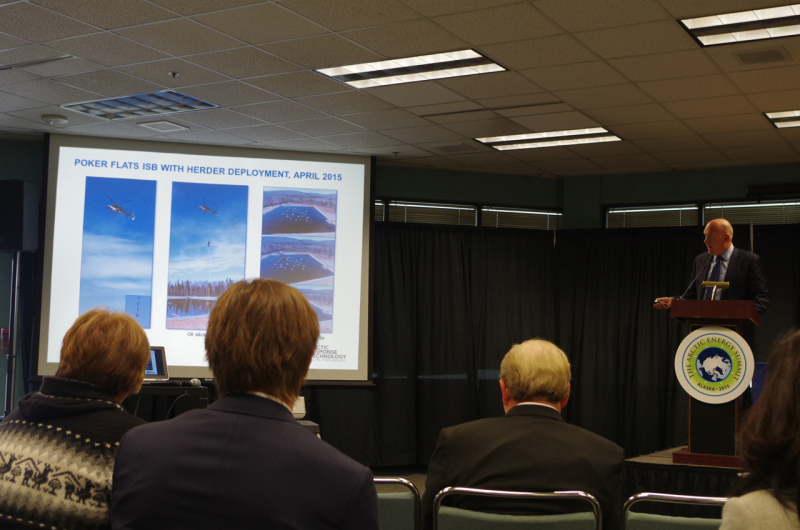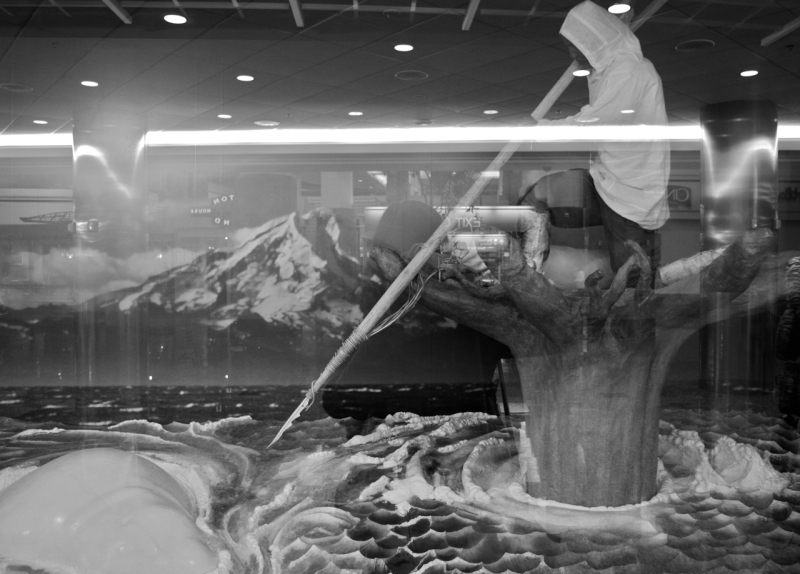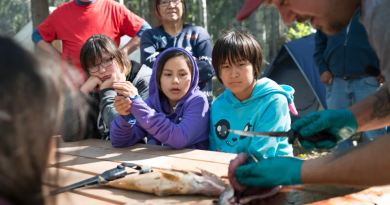Blog: Reindeer, oil at Energy Summit

Across the vast tundra of northern Eurasia, nomadic indigenous peoples have herded reindeer for thousands of years.
From the Sami in Fennoscandia and northwest Russia to the Chukchi in northeast Russia, herding reindeer is, for many Arctic peoples, a way of life. Reindeer provide food, clothing, and companionship on the tundra. But at theArctic Energy Summit in Fairbanks, Alaska this week, a newer herding activity in the Arctic came to light: herding oil.
Whereas reindeer herding is a continuous way of life, herding oil would only be necessary in an emergency, if there were an oil spill. Since 2004, led by ExxonMobil, the Arctic Oil Spill Response Technology Joint Industry Program (ART JIP) has been researching the use of “herders” like low-toxicity biodegradable surfactants – something like dishwashing soap – in ice-covered waters. These surfactants “herd the spreading oil back into a smaller, thicker slick,” according to this ExxonMobil report (p. 17). There’s even a brief video about successful herder experiments on the ART JIP’s main website. Once herded, the oil is easier to remove from the ocean, generally by burning.

Against the icy backdrop of the Arctic, the introduction of fire to get rid of oil seems like an almost hellish solution. But counterintuitively, in icy conditions, burning is sometimes the best possible response for cleaning up an oil spill. The presence of ice causes oil to form in thicker layers than in open water, making it thick enough to burn. ExxonMobil also claims that smoke plumes dissipate quickly in the Arctic, and in any case, they note that human populations are generally quite distant. While Arctic populations tend to be small and scattered, however, there are still many people who depend on the environment and marine ecosystem. There may be fewer people than in cities in the south, but they may be more vulnerable to the effects of an oil spill and its remediation, too.
Herding reindeer, herding oil
Executives of international oil corporations carefully choose their words. During a panel on oil and gas industry emergency prevention, preparedness, response, and collaboration (which should be available soon to watchhere), neither the Shell nor ExxonMobil executives uttered the two worst words for the 21st-century oil industry: Deepwater Horizon. To reference this disaster would evoke fiery explosions, black smoke, and birds with oil in their wings. Instead, the executives spoke of “Macondo” and the “post-Macondo” era – words more neutral and benign in their association, referring in more technical terms to the name of the actual prospect. When discussing Shell’s withdrawal from the Chukchi Sea, the two Shell representatives repeated verbatim phrases from the press release: “challenging and unpredictable,” regarding the regulatory environment, and “disappointing,” regarding the outcome.
So the choice of the word “herding” in the phrase “herding oil” must be understood within the wider context of corporate terminology. The word sounds bucolic, bringing to mind a shepherd and his flock of sheep, or in an Arctic context, a reindeer herder and his animals. Herding oil makes it sounds like it is something that just needs to be corralled into its proper place. It papers over how oil is much more viscous, sticky, and pervasive. The black liquid is not as easy to herd as reindeer, however stubborn some may be. Even today, if you dig into the sand on certain beaches along Prince William Sound, it is still possible to find oil a few inches down leftover from Exxon Valdez in 1989.
At the Arctic Energy Summit, I asked Anders Oskal, a Sami reindeer herder and Executive Director of theInternational Centre for Reindeer Husbandry in Kautokeino, Norway what he thought about the oil industry’s use of the term “herding.” He hadn’t heard of it before, and after I explained as best I could how the oil executives had described it, he responded, “We might call that edge herding.” Looking quizzical, though, he added, “You can’t drink oil. It’s not a food.” So the use of the word herding wouldn’t really work. Oskal asserted, “The day the oil industry knows a bit about herding, then we can discuss.”

Platforms for beluga spearing and oil extraction

At Ted Stevens International Airport in Anchorage, not so far from the site of the Exxon Valdez disaster, brightly lit ads for oil companies depicting their platforms jutting dramatically out of the frozen North Slope decorate the walls. The ads are hard to ignore (along with an ad at McDonald’s for the “McKinley Mac,” which is exclusive to Alaska. By the way, given the mountain’s official renaming, shouldn’t the burger be renamed Denali Mac?). Shell appears to have outspent the World Wildlife Foundation, whose smaller sign is underneath. The juxtaposition of the two signs – Shell’s about investing in Alaska’s future, and the WWF’s about securing the Arctic’s future, illustrates the longstanding battle between oil and environmentalists up north.

Tucked away in a dim corner between Gates B and C, however, was a small exhibit about indigenous technology in Alaska – the precursor to all the pipelines and platforms that would one day come to this land. In the nineteenth century, the Dena’ina Athabascans of Southcentral Alaska would dig up a spruce tree and turn it upside down before sticking it into the shallow shorefronts of Cook Inlet. The tree roots thus served as a elevated platform above the ocean, called a yuyqul, from which the Alaska Athabascans could throw spears at beluga whales coming inshore to eat salmon. This 100-year old marine technology to harvest resources from the ocean is an eerie predecessor to the oil platforms that would dot the North Slope seventy years later.
The Dena’ina Athabascans abandoned their yuyquls after firearms were introduced. This is not necessarily surprising. Oskal stressed to me that Arctic indigenous peoples have always been quick to take up new technology. He referenced studies done in the early 1990s that concluded the high ownership rate of mobile phones in Norway and Finland, which at the time were some of the highest in the world, were likely due to early adoption by the Sami. Indeed, as we spoke, he kept turning his cell phone over and over in his hands, almost methodically, and mentioned advances in battery technology.
Co-existence between reindeer and oil in the Arctic
The experience of the Dena’ina Athabascans and the Sami demonstrates that indigenous peoples can be just as forward-looking in terms of technological advances as the oil company. Indigenous peoples use technologies perfected over thousands of years, just like oil companies. Sometimes the two technological paths even meet, as in the case of platforms or cell phones.
Still, there are fundamental differences between oil extraction and reindeer herding. The oil industry is extractive and takes as much of the resource as it can get. It generates cumulative effects on the land and erects lots of permanent infrastructure to get to its resource, including roads, railways, and pipelines. In contrast, reindeer herding is nomadic and has a much lower footprint while tending to take only what it needs from the environment. Despite these differences, though, the two ways of life – extraction and reindeer herding – can co-exist under certain circumstances.
Florian Stammler, a Professor of Arctic Anthropology at the Arctic Centre in Finland, explained during his plenary talk how the oil industry and reindeer herders exist side-by-side in the Yamal-Nenets Autonomous Okrug in northern Russia. One of the reindeer herders he spoke to during fieldwork remarked that the oil companies have a right to be on the land and use it, too, and that life is more fun with the neftyaniki (oil workers) there. But reindeer herding and oil herding may be less compatible, for oil herding would mean that a disaster had happened: an oil spill in the Arctic. This is a situation that everybody wants to avoid. Industry and indigenous lifeways are compatible, but that compatibility has its limits.
Still, Oskal, the Sami reindeer herder skeptical of the use of the word “herding,” made clear during his plenary presentation that the oil industry is not necessarily the reindeer herder’s enemy. “It can even be quite profitable,” he attested. Renewable energy, like wind turbines, can be more destructive in terms of their impact on land – the most important resource for reindeer herders moving from place to place. The ideal environment for wind turbines is often on the same cool, high, windy grounds where reindeer herders might bring their animals to rest and cool down in summer and avoid mosquitos.
Several Alaska Natives I spoke to in Fairbanks mentioned that the oil companies were in fact doing a lot better job with respecting the environment and training and hiring locals than before. I have to admit that I was initially in disbelief when an oil company representative asked rhetorically during a panel, “Can bowhead whales smell?” (a comment which referenced how Inupiat knowledge informed scientific studies about these marine mammals’ olfactory senses, and which also brought to mind the work of anthropologist Julie Cruikshank, who wrote the seminal book Do Glaciers Listen?). For all the untold undesirable effects that oil extraction causes to the land, water, and air, companies are more aware than in previous decades of the people, animals, and environment where they are operating. They have also helped to fund a wealth of Arctic research – especially into bowhead whales.
So oil companies are consulting and partnering with a good number of Arctic indigenous peoples and anthropologists, but they are also continuing to hire some really talented people in public relations. As Oskal joked, “Maybe they’ll start saying oil husbandry.”
This post first appeared on Cryopolitics, an Arctic News and Analysis blog.
Related stories from around the North:
Canada: Canadian Inuit leader receives intn’l award, Eye on the Arctic
Finland: UN rep. urges suspension of Sámi elections, Yle News
Greenland: What the EU seal ban has meant for Inuit communities in the Arctic, Eye on the Arctic
Iceland: Calls for action at Arctic shipping conference, Alaska Dispatch News
Norway: Arctic Council aims to boost business, Barents Observer
Russia: China to provide parts for Russian offshore projects, Barents Observer
Sweden: Sami demand rights as indigenous people, Radio Sweden
United States: Arctic Energy Summit – Mood subdued after Shell news, Blog by Mia Bennett




